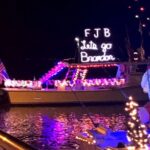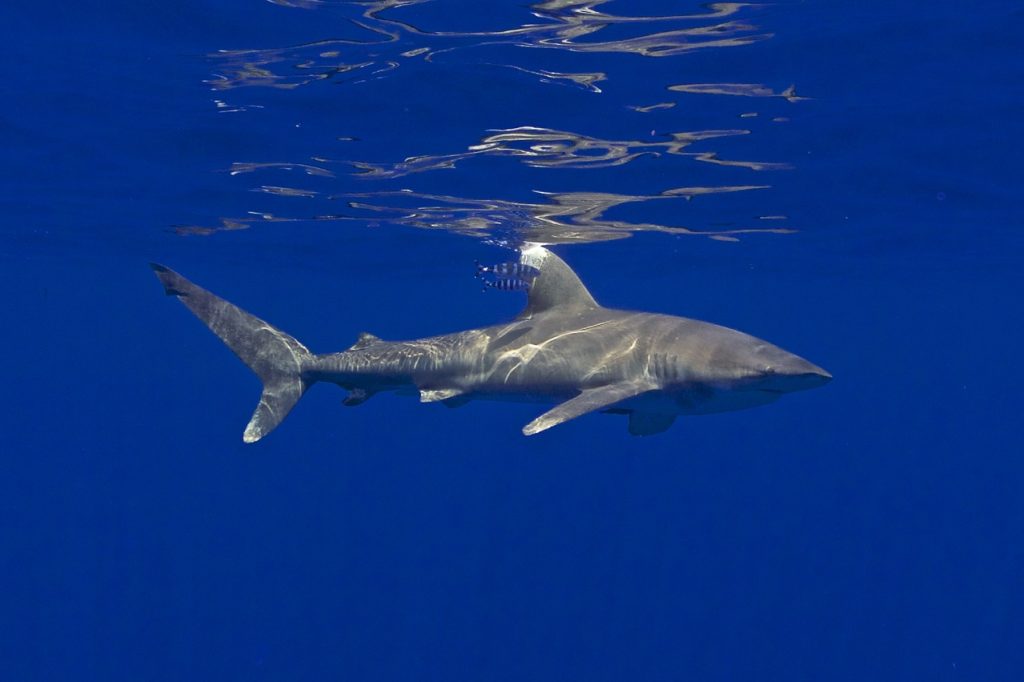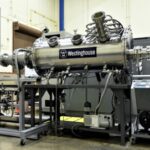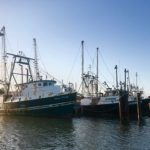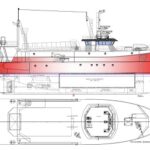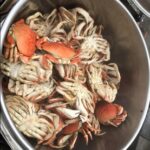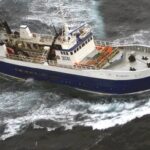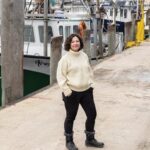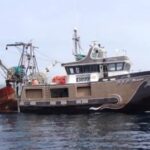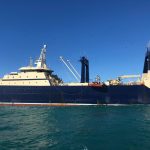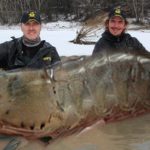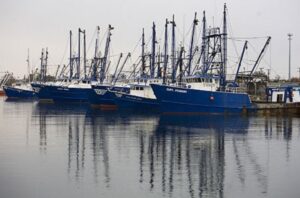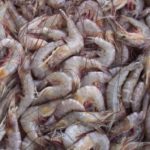Tag Archives: Atlantic salmon
Conne River salmon on the road to extinction, says DFO study, with aquaculture a leading factor
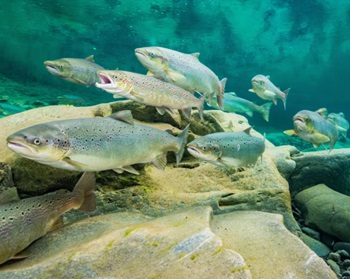 A new comprehensive review of Atlantic salmon in Conne River, on Newfoundland’s south coast, says aquaculture operations are the biggest reason for the population decline — and if things don’t change, the fish could be wiped out. Travis Van Leeuwen, a Department of Fisheries and Oceans research scientist and co-author of the report, released in April, says the river had at least 10,000 large and small salmon, but since 2020 fewer than 300 adult salmon return to Conne River every year. Marine cage culture salmonids started in the mid-1980s at Bay d’Espoir and later expanded east into Fortune Bay. In 1992, Newfoundland and Labrador’s commercial salmon fishery ended. But while the salmon population in rivers in other areas of the province bounced back, Conne River’s continued to decline. more, >>CLICK TO READ<< 16:49
A new comprehensive review of Atlantic salmon in Conne River, on Newfoundland’s south coast, says aquaculture operations are the biggest reason for the population decline — and if things don’t change, the fish could be wiped out. Travis Van Leeuwen, a Department of Fisheries and Oceans research scientist and co-author of the report, released in April, says the river had at least 10,000 large and small salmon, but since 2020 fewer than 300 adult salmon return to Conne River every year. Marine cage culture salmonids started in the mid-1980s at Bay d’Espoir and later expanded east into Fortune Bay. In 1992, Newfoundland and Labrador’s commercial salmon fishery ended. But while the salmon population in rivers in other areas of the province bounced back, Conne River’s continued to decline. more, >>CLICK TO READ<< 16:49
From tiny river eggs to ocean prey, filmmaker aims to capture life of salmon
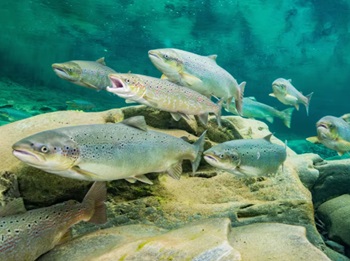 As a child fly fishing on New Brunswick’s renowned Miramichi River, Nick Hawkins used to daydream about being able to peer under the tea-coloured water and see where the salmon were. Hawkins is one of nine winners of 2024 grants from the Trebek Initiative, named for the late quiz show host Alex Trebek. He’s getting $97,674 from two organizations that Trebek supported, the Royal Canadian Geographical Society and National Geographic Society, to film the migration of Atlantic salmon — “from their home rivers in Canada to their feeding grounds in the icy fjords of Greenland” — and to document “the passionate efforts of those trying to reverse the species’ precipitous decline.” Photos, more, >>CLICK TO READ<< 08:17
As a child fly fishing on New Brunswick’s renowned Miramichi River, Nick Hawkins used to daydream about being able to peer under the tea-coloured water and see where the salmon were. Hawkins is one of nine winners of 2024 grants from the Trebek Initiative, named for the late quiz show host Alex Trebek. He’s getting $97,674 from two organizations that Trebek supported, the Royal Canadian Geographical Society and National Geographic Society, to film the migration of Atlantic salmon — “from their home rivers in Canada to their feeding grounds in the icy fjords of Greenland” — and to document “the passionate efforts of those trying to reverse the species’ precipitous decline.” Photos, more, >>CLICK TO READ<< 08:17
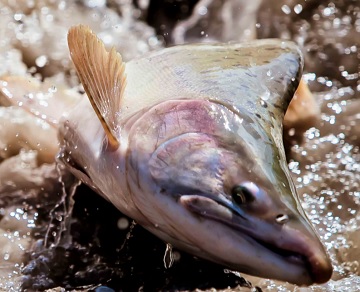
Invasive pink salmon populations are increasing throughout native Atlantic salmon waters
Fisheries biologists have been wringing their hands for decades in cold-water regions of the Pacific Ocean due to the proliferation of farmed Atlantic salmon and the threats they pose to native fish and the health of inshore waters, both in North America off the coasts of the U.S. and Canada, and in South America, where salmon farms are common off the coast of Chile. The threats are real, and there are lots of them,,, But, until recently, the presence of Pacific salmon in the North Atlantic hasn’t moved the “environmental disaster” needle much. That’s changing, thanks to an invasive Pacific salmon that is showing up in larger numbers in traditional Atlantic salmon rivers in Scandinavia, as far south as the British Isles and even to the east coast of Canada. The culprit in question is pink salmon, the smallest and most numerous of the Pacific salmon family. >click to read< 13:20
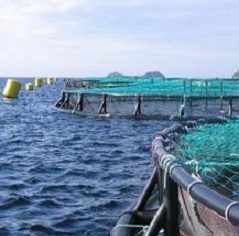
A history of toxic chemicals in the fish farming industry
When fish farms first appeared on the coast in the late 1970s, they seemed like an interesting idea. They could provide food, meet consumer demand, and perhaps alleviate the stress on wild stocks.,, Atlantic salmon and Norwegian owners became the new face of fish farms. The salmon are densely packed into the net pens, moving among their own faeces, fish pellets, and chemicals that are regularly dumped into the pens to deter the prevalent bacteria and sea lice that these conditions give rise to.,, “Many of the pesticides, insecticides and fungicides used by salmon farmers are derived from the Second World War’s chemical weapons programs,” writes Don Staniford in A Stain upon the Sea. These chemicals, used internationally, have poisoned the land via commercial agriculture, but were never intended to be dumped into the sea via aquaculture. >click to read< 09’10
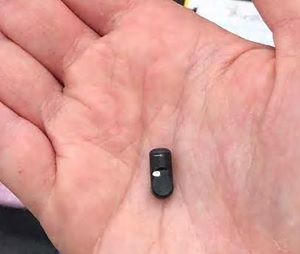
A fish tag that knows it’s been eaten is helping endangered Atlantic salmon
New tracking devices inserted into Atlantic salmon reveal that up to 48 per cent of the critically endangered fish are being eaten while leaving Nova Scotia’s Stewiacke River on their ocean migration. The insight is the result of acoustic tags that can tell when a tagged fish has been eaten.,, Striped bass the main predator,,, One thing has not changed: Atlantic salmon remain in deep trouble in the inner Bay of Fundy rivers where they are wiped out or on the brink of extinction. >click to read< 10:13
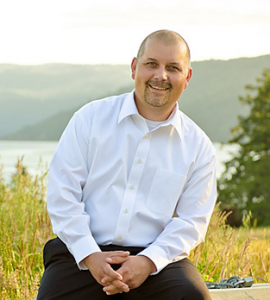
Green MLA Adam Olsen says it’s time to get Atlantic salmon out of B.C. waters
A major blow has been inflicted on the Atlantic-salmon-farming industry in Washington State. This has one provincial lawmaker calling for similar action in the coastal waters of British Columbia. Saanich North and the Islands Green MLA Adam Olsen says the time has come to end open-net farming of Atlantic salmon. Olsen is a member of the Tsartlip First Nation and has long advocated for protecting the Salish Sea and Saanich Inlet. >click to read< 15:50
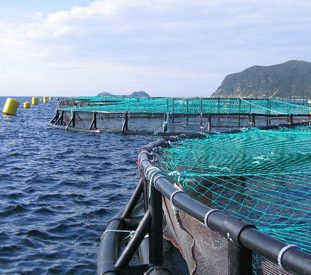
Washington State could end net pens for fish by 2024
By 2024, Washington could ban all net pens where nonnative fish are raised commercially. A bill approved Thursday by the Senate Agriculture, Natural Resources and Water Committee would keep the state from renewing the existing leases as they expire between 2022 and 2024. No new leases are being issued but the state has legal obligations to honor current leases. The proposal also calls for an extensive study of the practice of raising fish in large pens by companies that lease space in Washington waters. It would be presented to the Legislature in January 2021. >click here to read< 14:41
New bill could put Washington salmon farms in jeopardy – >click here to read< 
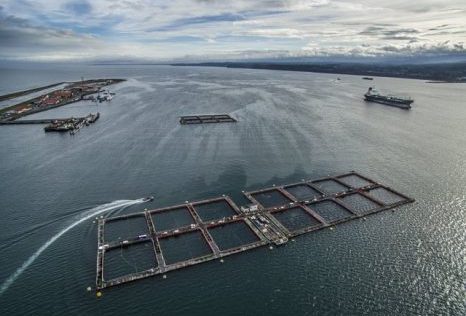
Violations prompt Washington state to cancel Atlantic salmon farm lease at Port Angeles
Cooke Aquaculture Pacific has lost the lease for its Atlantic salmon net-pen farm in Port Angeles and must shut down and remove it, said Hilary Franz, state commissioner of public lands, who terminated Cooke’s lease. The farm, operated by a series of owners since 1984, currently holds nearly 700,000 Atlantic salmon. Franz said the Washington Department of Natural Resources (DNR) would work with other state agencies to enforce an orderly shutdown and complete removal of the farm. Franz said her decision is final. “There is no room for negotiation.” click here to read the story 14:24
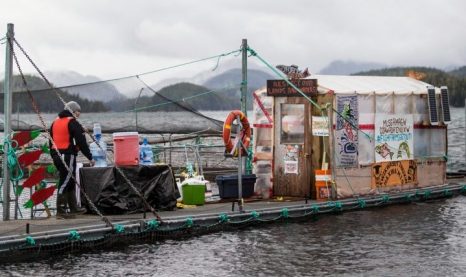
B.C. fish farms: a tangled net
Industrial fish farming began in British Columbia with a few small experiments in the 1970s. By the 1990s, it was operating like a well-oiled machine: Smaller farms had been swallowed by large conglomerates, and imported Atlantic salmon had become the preferred breed — the Herefords of aquaculture.,,, So, are fish farms bad? Federal research scientist Kristi Miller says she understands the frustration of not having a definitive answer. click here to read the story 09:43
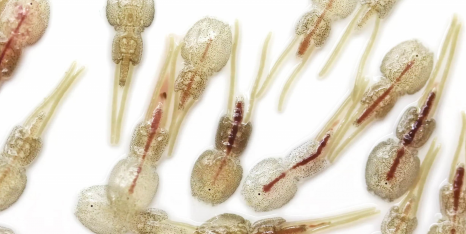
Why ‘normal’ salmon don’t get as many parasites
New research reveals the inherent ability of salmon to avoid infection through their first line of defense—behavior. In the rapidly growing fish-farming industry, parasite outbreaks cause production inefficiencies, poor welfare for billions of fish, and negative consequences for wild populations when diseases spread. “Parasite outbreaks in wild fish have been induced by farmed fish in major farming systems, such as sea lice infestations on wild salmon in Europe and North America,” says Tim Dempster, associate professor in the School of BioSciences at the University of Melbourne. click here to read the story 15:25
More Atlantic salmon coming to Puget Sound despite objections
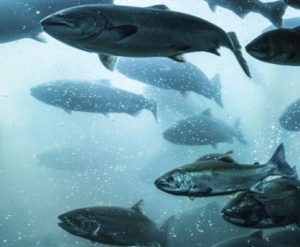 The company that spilled thousands of invasive salmon into Puget Sound is sending 1 million more into local pens despite objections from state officials. “We are very concerned about Cooke Aquaculture’s plan to transfer up to 1 million Atlantic salmon smolts to a in Clam Bay across from Bainbridge Island. This is disappointing and frustrating, coming on the heels of the August collapse of Cooke’s net pen near Cypress Island that held 305,000 fish,” Washington Governor Jay Inslee said. click here to read the story 10:15
The company that spilled thousands of invasive salmon into Puget Sound is sending 1 million more into local pens despite objections from state officials. “We are very concerned about Cooke Aquaculture’s plan to transfer up to 1 million Atlantic salmon smolts to a in Clam Bay across from Bainbridge Island. This is disappointing and frustrating, coming on the heels of the August collapse of Cooke’s net pen near Cypress Island that held 305,000 fish,” Washington Governor Jay Inslee said. click here to read the story 10:15
State gives OK to new salmon farm permit – The state found, however, that Fish and Wildlife didn’t have the authority to deny a permit to transfer fish into an existing pen, according to the joint release from Inslee and Franz. click here to read the story 10:42
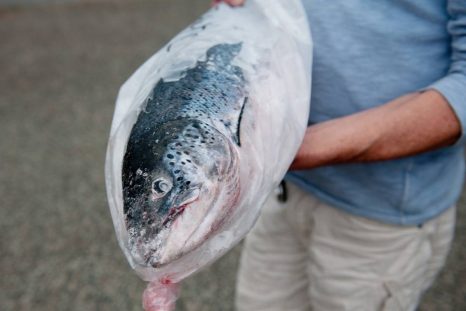
Atlantic salmon arrive in French Creek – Not in a good way!
Atlantic salmon, believed to be part of a cohort that escaped from a U.S.-based fish farm on Aug. 19, are being hauled in by anglers fishing out of French Creek on mid-Vancouver Island.
Cameron Wheatley, owner of the French Creek Store at the marina just north of Parksville, received the head of an apparent Atlantic salmon from a local angler late Sunday morning, Sept. 10. He is freezing the head, along with two more fish heads and one whole farm-raised salmon, to turn over to Fisheries and Oceans Canada. click here to read the story 16:33
In the Atlantic salmon fight, Greenland proves a sticking point
 Preventing the long-imperiled Atlantic salmon from disappearing from American waters will require the U.S. to put pressure on Inuit fishermen in Greenland to stop harvesting a fish that has fed them for hundreds of years, federal officials say. The salmon were once found from Long Island Sound to Canada, but their population has cratered in the face of river damming, warming ocean waters, competition for food with non-native fish and, officials say, continued Greenlandic fishing. Now, federal officials have outlined an ambitious plan to try to save the Atlantic salmon that they say will require removing dams, creating fish passages and fostering cooperation from Inuit fishermen some 2,000 miles away from Maine, Read the rest here 13:17
Preventing the long-imperiled Atlantic salmon from disappearing from American waters will require the U.S. to put pressure on Inuit fishermen in Greenland to stop harvesting a fish that has fed them for hundreds of years, federal officials say. The salmon were once found from Long Island Sound to Canada, but their population has cratered in the face of river damming, warming ocean waters, competition for food with non-native fish and, officials say, continued Greenlandic fishing. Now, federal officials have outlined an ambitious plan to try to save the Atlantic salmon that they say will require removing dams, creating fish passages and fostering cooperation from Inuit fishermen some 2,000 miles away from Maine, Read the rest here 13:17
Atlantic Salmon Found Spawning In Farmington River Watershed For First Time in Centuries
State wildlife experts have now documented wild Atlantic salmon laying eggs in nests in their traditional Farmington River valley spawning grounds, possibly for the first time in centuries. “It’s the first time since probably the Revolutionary War,” said Peter Aarrestad, director of inland fisheries for the state Department of Energy and Environmental Protection. The three wild salmon nests, or “redds,” were discovered in November upstream of the Rainbow Dam fishway in Windsor, somewhere “within the Farmington River watershed,” Aarrestad said. Read the rest here 15:41
This is good! The truth about Atlantic salmon, Owen Myers, St. John’s
 The Atlantic Salmon Federation (ASF) is an elitist mainland/foreign organization that is not the last word in Atlantic salmon conservation, much as they would like us to think otherwise. The board of directors is stacked with old political warhorses and looks like the Senate. Those guys are into catch and release on a helicopter-only river in Labrador out of sight of public scrutiny, and have gourmet meals in palatial surroundings. What the ASF is not saying is that conservation of our salmon will only be achieved when we force the Norwegians and their front men in salmon farming in this province to grow aquaculture salmon in on-land tanks. Read the rest here 10:01
The Atlantic Salmon Federation (ASF) is an elitist mainland/foreign organization that is not the last word in Atlantic salmon conservation, much as they would like us to think otherwise. The board of directors is stacked with old political warhorses and looks like the Senate. Those guys are into catch and release on a helicopter-only river in Labrador out of sight of public scrutiny, and have gourmet meals in palatial surroundings. What the ASF is not saying is that conservation of our salmon will only be achieved when we force the Norwegians and their front men in salmon farming in this province to grow aquaculture salmon in on-land tanks. Read the rest here 10:01
Anatomy of Mersey hatchery’s destruction
![]() Atlantic salmon in Nova Scotia are in trouble, and Fisheries and Oceans is a big part of that problem. In May of 2013, the Mersey Bio-diversity Facility Supporters Society (MBFSS) was formed and registered with Joint Stocks as a result of concerns of the Medway River Salmon Association. Read more here chronicleherald 06:11
Atlantic salmon in Nova Scotia are in trouble, and Fisheries and Oceans is a big part of that problem. In May of 2013, the Mersey Bio-diversity Facility Supporters Society (MBFSS) was formed and registered with Joint Stocks as a result of concerns of the Medway River Salmon Association. Read more here chronicleherald 06:11
The Downeast Salmon Federation hopes ‘planting’ salmon eggs in rivers will restore population
 The technique simulates natural activities of salmon reproduction. A female salmon creates a nest, called a redd, in the gravel of a streambed or riverbed in the fall. Using her tail, the fish scoops out a pit, lays her eggs, then covers them with gravel to protect them until they hatch in the spring. Read more@sunjournal.com 08:05
The technique simulates natural activities of salmon reproduction. A female salmon creates a nest, called a redd, in the gravel of a streambed or riverbed in the fall. Using her tail, the fish scoops out a pit, lays her eggs, then covers them with gravel to protect them until they hatch in the spring. Read more@sunjournal.com 08:05
Groups seek to shut down dam turbines, save Atlantic salmon
 BANGOR, Maine — Two citizen conservation groups last week asked a federal judge to order the temporary shutdown of hydroelectric turbines that they say will threaten thousands of endangered Atlantic salmon when those fish try to migrate out of the Kennebec and Androscoggin rivers this spring. continue
BANGOR, Maine — Two citizen conservation groups last week asked a federal judge to order the temporary shutdown of hydroelectric turbines that they say will threaten thousands of endangered Atlantic salmon when those fish try to migrate out of the Kennebec and Androscoggin rivers this spring. continue
Cooke’s first salmon harvest – to be displayed at the Boston Seafood Show
 Hundreds of thousands of Atlantic salmon are being sucked from their pens in the first ever harvest of fish from a Cooke Aquaculture site in St. Marys Bay. He then opened a box to reveal a silver-sided salmon on ice, the first fish harvested and now ready to be displayed this weekend at the Boston Seafood Show. Read more
Hundreds of thousands of Atlantic salmon are being sucked from their pens in the first ever harvest of fish from a Cooke Aquaculture site in St. Marys Bay. He then opened a box to reveal a silver-sided salmon on ice, the first fish harvested and now ready to be displayed this weekend at the Boston Seafood Show. Read more
Hoping ‘to turn the tide’ on Atlantic salmon-improved hydraulic egg-planting method
 Near a site along the eastern branch of the Sheepscot River last week, Maine Department of Marine Resources biologist Paul Christman prepared the salmon eggs, carefully lifting the tiny pinkish-orange orbs wrapped in damp cheesecloth and placing them into a wide-mouthed beverage cooler. The eggs, fertilized last fall at Green Lake National Fish Hatchery in Ellsworth, have developed small black specks for eyes and are no larger than the tip of a child’s pinkie finger. They’re stronger than recently fertilized eggs, Christman said. Read more, video
Near a site along the eastern branch of the Sheepscot River last week, Maine Department of Marine Resources biologist Paul Christman prepared the salmon eggs, carefully lifting the tiny pinkish-orange orbs wrapped in damp cheesecloth and placing them into a wide-mouthed beverage cooler. The eggs, fertilized last fall at Green Lake National Fish Hatchery in Ellsworth, have developed small black specks for eyes and are no larger than the tip of a child’s pinkie finger. They’re stronger than recently fertilized eggs, Christman said. Read more, video






 The recovery in Greenland and Ireland of two electronic tags attached to salmon in New Brunswick in 2014 is giving researchers valuable insight into the travels of the fish. The tags are attached to selected salmon by the Atlantic Salmon Federation in an effort to try and discover the reasons for high mortality at sea. On May 14, 2014, a 93-cm kelt — a salmon that spawned the previous fall and was returning to sea to feed before turning to span again — was tagged in the Red Bank area on the Northwest Miramichi River.
The recovery in Greenland and Ireland of two electronic tags attached to salmon in New Brunswick in 2014 is giving researchers valuable insight into the travels of the fish. The tags are attached to selected salmon by the Atlantic Salmon Federation in an effort to try and discover the reasons for high mortality at sea. On May 14, 2014, a 93-cm kelt — a salmon that spawned the previous fall and was returning to sea to feed before turning to span again — was tagged in the Red Bank area on the Northwest Miramichi River. 


























